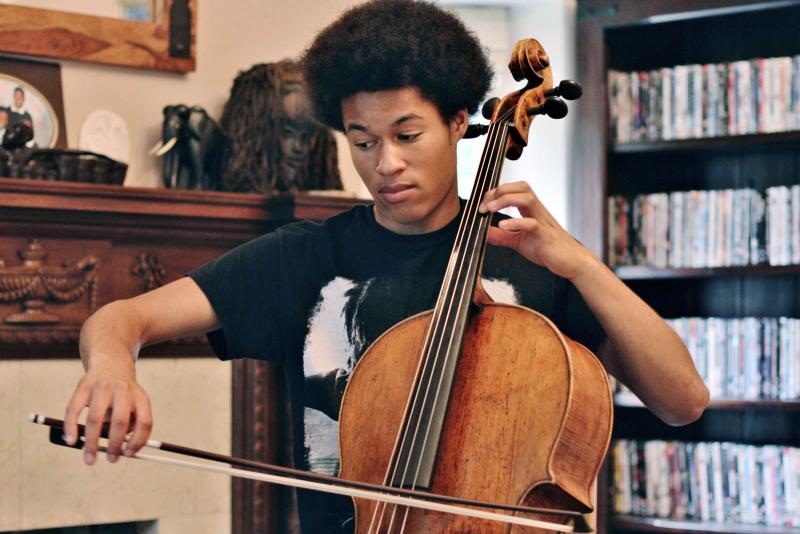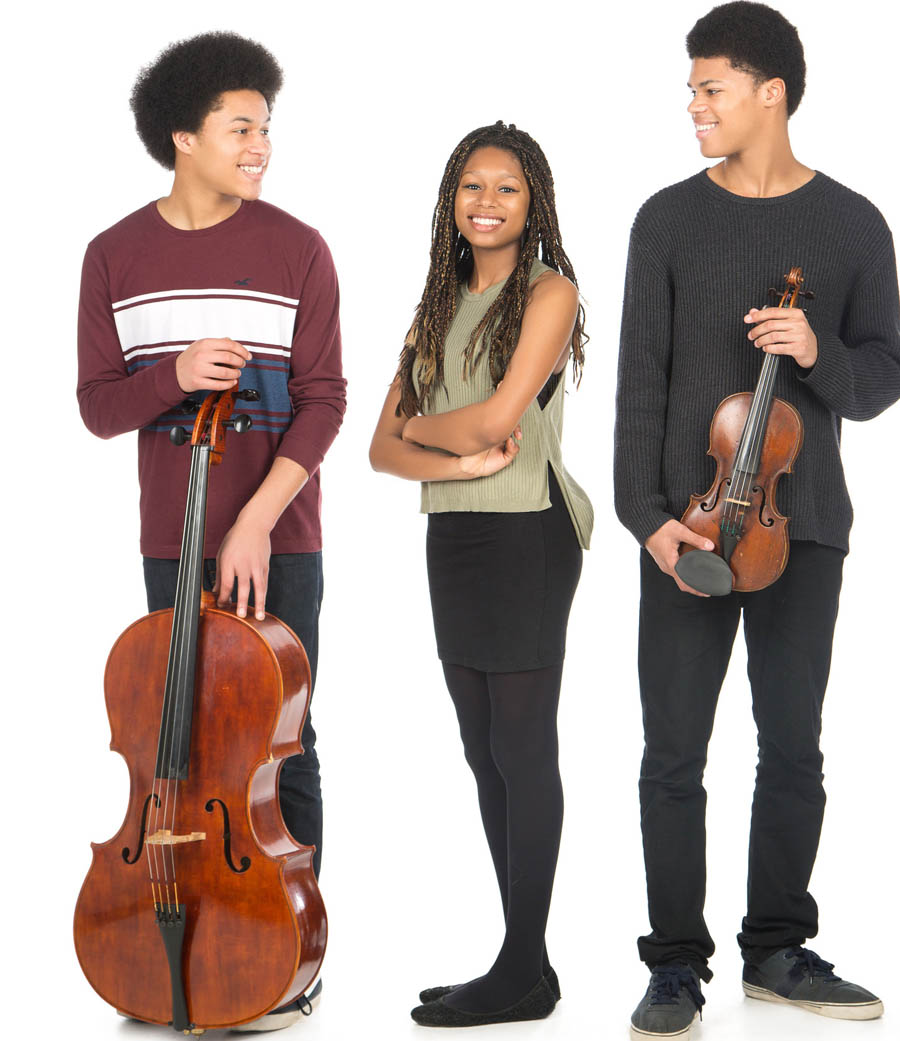Young, Gifted and Classical: The Making of a Maestro, BBC Four | reviews, news & interviews
Young, Gifted and Classical: The Making of a Maestro, BBC Four
Young, Gifted and Classical: The Making of a Maestro, BBC Four
Is diversity the key to classical music's future?

This is a documentary about a minority in a minority, a riff on young, gifted and black. And how better to attract both practitioners and audiences to classical music than by encouraging diversity? The totally startling statistic was that in the UK, only five per cent of classical musicians are black or from ethnic minorities.
The programme focussed on the Kanneh-Mason family, the parents Stuart and Kadiatu and their seven children (two boys, five girls), from the 20-year-old pianist Isata, now the holder of the Elton John scholarship at the Royal Academy of Music, on down. Their Nottingham house contained three pianos, four violins, three cellos and one viola. The narrative centred on the third child, Sheku, a profoundly gifted cellist who won, aged 17, the BBC Young Musician of the Year last summer, the first black musician ever to do so.
 We plunged in with an exhilarating clip of Sheku playing for his final the Shostakovich Cello Concerto No 1 – all his entries had been compositions by Shostakovich – and the excitement which accompanied his performance was palpable. He and his cello are one, a colleague said, and Sheku, whose personality in the film was almost alarmingly calm, evidently told us whatever he wished to express, a massive range of emotions and feelings, through his cello. Isata, his older brother Braimah, a violinist, also a student at the RAM, and he are already the Kanneh-Mason trio (Sheku, Isata and Braimah pictured above).
We plunged in with an exhilarating clip of Sheku playing for his final the Shostakovich Cello Concerto No 1 – all his entries had been compositions by Shostakovich – and the excitement which accompanied his performance was palpable. He and his cello are one, a colleague said, and Sheku, whose personality in the film was almost alarmingly calm, evidently told us whatever he wished to express, a massive range of emotions and feelings, through his cello. Isata, his older brother Braimah, a violinist, also a student at the RAM, and he are already the Kanneh-Mason trio (Sheku, Isata and Braimah pictured above).
The family were all handsome, articulate, hardworking and dedicated, and the head of the Royal Academy of Music told us the Kanneh-Masons were exceedingly rare. The personal investment has been huge. For the past 10 years, one or other or more of the siblings got up at 4.30am every Saturday with their mother to go on the 200 mile journey on the 7.30 train to the Junior Royal Academy of Music in London. The mother, Kadiatu, told us something of the sacrifices they all make. The house badly needed some maintenance, but with rehairing a bow costing £60 and replacing a broken string £85 a time, money was short. The Trinity Catholic comprehensive school in Nottingham was also crucial: music was important in the curriculum, and the school was certainly supportive.
When they came home from school it was food – lots of it – and then practice, two hours every weekday, three hours on weekends. The kids practised everywhere and anywhere, hallways, bedrooms, corridors, even occasionally in bathrooms where the tiles make for a rich if misleading acoustic. Evidently there is also uninhibited competition and criticism from one sibling to another, easier (they said) to accept from family members. Advice was also given in a charming interview with the violinist Nicola Benedetti (winner of the Young Musician in 2004, aged 16) when she told Sheku that a bit of stress would also help to deepen his music making: a broken heart would do it, she said cheerfully. Managers and record companies have come calling, and we met Kathryn Enticott, the agent the family have chosen. As Sheku said, his job was to play the cello, not organise his life. And yes, he is staying on to take his A levels.
 Parallel to the story of the Kanneh-Masons (the family, pictured above) were interviews with Chi-Chi Nwanoku, the charismatic half-Nigerian double bass player who founded the Chineke! Orchestra, which comprises black and ethnic minority musicians from several countries. Three of the siblings played in the Chineke! and Sheku was their first soloist, in Haydn’s Cello Concerto in C Major. For the occasion he was lent the early 17th century Amati cello, which he had badly missed since he had borrowed it for the BBC competition. Someone lend that boy a world class cello, please, as he is going to be a world class musician. And by the way, just beyond the classics, his best loved music is Bob Marley.
Parallel to the story of the Kanneh-Masons (the family, pictured above) were interviews with Chi-Chi Nwanoku, the charismatic half-Nigerian double bass player who founded the Chineke! Orchestra, which comprises black and ethnic minority musicians from several countries. Three of the siblings played in the Chineke! and Sheku was their first soloist, in Haydn’s Cello Concerto in C Major. For the occasion he was lent the early 17th century Amati cello, which he had badly missed since he had borrowed it for the BBC competition. Someone lend that boy a world class cello, please, as he is going to be a world class musician. And by the way, just beyond the classics, his best loved music is Bob Marley.
The story had some fascinating omissions. The father, Stuart, worked away from his Nottingham home Monday to Friday but we were not told what he did; was the family always Nottingham-based, and how and when did classical music become the centre of all their lives? More questions than answers, but follow that Sheku – and his siblings.
The future of Arts Journalism
You can stop theartsdesk.com closing!
We urgently need financing to survive. Our fundraising drive has thus far raised £49,000 but we need to reach £100,000 or we will be forced to close. Please contribute here: https://gofund.me/c3f6033d
And if you can forward this information to anyone who might assist, we’d be grateful.

Subscribe to theartsdesk.com
Thank you for continuing to read our work on theartsdesk.com. For unlimited access to every article in its entirety, including our archive of more than 15,000 pieces, we're asking for £5 per month or £40 per year. We feel it's a very good deal, and hope you do too.
To take a subscription now simply click here.
And if you're looking for that extra gift for a friend or family member, why not treat them to a theartsdesk.com gift subscription?
more TV
 The Perfect Neighbor, Netflix review - Florida found-footage documentary is a harrowing watch
Sundance winner chronicles a death that should have been prevented
The Perfect Neighbor, Netflix review - Florida found-footage documentary is a harrowing watch
Sundance winner chronicles a death that should have been prevented
 Murder Before Evensong, Acorn TV review - death comes to the picturesque village of Champton
The Rev Richard Coles's sleuthing cleric hits the screen
Murder Before Evensong, Acorn TV review - death comes to the picturesque village of Champton
The Rev Richard Coles's sleuthing cleric hits the screen
 Black Rabbit, Netflix review - grime and punishment in New York City
Jude Law and Jason Bateman tread the thin line between love and hate
Black Rabbit, Netflix review - grime and punishment in New York City
Jude Law and Jason Bateman tread the thin line between love and hate
 The Hack, ITV review - plodding anatomy of twin UK scandals
Jack Thorne's skill can't disguise the bagginess of his double-headed material
The Hack, ITV review - plodding anatomy of twin UK scandals
Jack Thorne's skill can't disguise the bagginess of his double-headed material
 Slow Horses, Series 5, Apple TV+ review - terror, trauma and impeccable comic timing
Jackson Lamb's band of MI5 misfits continues to fascinate and amuse
Slow Horses, Series 5, Apple TV+ review - terror, trauma and impeccable comic timing
Jackson Lamb's band of MI5 misfits continues to fascinate and amuse
 Coldwater, ITV1 review - horror and black comedy in the Highlands
Superb cast lights up David Ireland's cunning thriller
Coldwater, ITV1 review - horror and black comedy in the Highlands
Superb cast lights up David Ireland's cunning thriller
 Blu-ray: The Sweeney - Series One
Influential and entertaining 1970s police drama, handsomely restored
Blu-ray: The Sweeney - Series One
Influential and entertaining 1970s police drama, handsomely restored
 I Fought the Law, ITVX review - how an 800-year-old law was challenged and changed
Sheridan Smith's raw performance dominates ITV's new docudrama about injustice
I Fought the Law, ITVX review - how an 800-year-old law was challenged and changed
Sheridan Smith's raw performance dominates ITV's new docudrama about injustice
 The Paper, Sky Max review - a spinoff of the US Office worth waiting 20 years for
Perfectly judged recycling of the original's key elements, with a star turn at its heart
The Paper, Sky Max review - a spinoff of the US Office worth waiting 20 years for
Perfectly judged recycling of the original's key elements, with a star turn at its heart
 The Guest, BBC One review - be careful what you wish for
A terrific Eve Myles stars in addictive Welsh mystery
The Guest, BBC One review - be careful what you wish for
A terrific Eve Myles stars in addictive Welsh mystery
 theartsdesk Q&A: Suranne Jones on 'Hostage', power pants and politics
The star and producer talks about taking on the role of Prime Minister, wearing high heels and living in the public eye
theartsdesk Q&A: Suranne Jones on 'Hostage', power pants and politics
The star and producer talks about taking on the role of Prime Minister, wearing high heels and living in the public eye
 King & Conqueror, BBC One review - not many kicks in 1066
Turgid medieval drama leaves viewers in the dark
King & Conqueror, BBC One review - not many kicks in 1066
Turgid medieval drama leaves viewers in the dark

Add comment